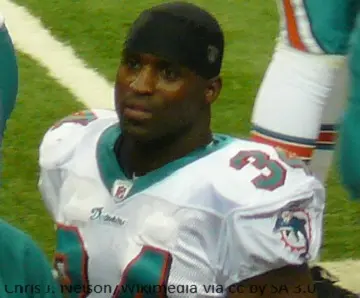
Twenty years ago, the New Orleans Saints traded away their entire collection of draft picks, plus a first-round and third-round pick the following year, to get Ricky Williams. It’s widely hailed as one of the worst trades in NFL history. No doubt, it was one of the most notorious trades, made far more notable by all the pomp and circumstance around it. Mike Ditka wearing dreadlocks, the wedding gown photo, Williams having a rapper as his agent, and the fact that a team gave away everything for a running back add to its legend.
I am going to look back at the trade, and re-examine some of those thoughts. I am not going to defend the thought process that led to the trade. I am going to point out, however, that if it was one of the worst trades in NFL history, the Saints themselves were far from the biggest losers in the whole sordid mess.
For those that don’t remember, this trade did not just happen out of nowhere. Mike Ditka, not exactly the best poker player out there, wasn’t exactly keeping his desires for Ricky Williams secret. The Saints had been trying to trade up with the Browns and anyone else who would listen, as represented by this Sandusky Register article from April 13, 1999.
On the 20th anniversary of the Ricky Williams trade, some extra notes. The Saints spent all week trying to get to the top of the draft, including exploring trades with the expansion Browns. pic.twitter.com/J9g6VtRzVi
— Deja Avenue (@Deja_Avenue) April 18, 2019
Leland Hardy, Williams’ agent, declared him to be “the Holy Grail of this draft,” and Mike Ditka compared him to Walter Payton “without as many moves, but with more power.” Ditka and the Saints desperately tried to move up all week, without success. Then, the Colts took Edgerrin James instead of Ricky Williams with the fourth overall pick, in a move that surprised many at the time, and things opened back up. Washington was willing to move down at number 5, and Williams was still there. Ditka attributed the stars aligning to the power of prayer, in a powerful case of “be careful what you ask for.”
But there is one problem with the narrative that this is one of the worst trades ever. Ricky Williams was actually better and more valuable than the collective group of eight players selected with the picks the Saints gave up. Yes, the rationale, decision-making, and negotiation skills were lacking. But you can find plenty of trades where that is the case and the end results were also disastrous. Ricky Williams, though, was a pretty good football player, and still had plenty of value three years later when the Saints traded him to the Dolphins for a package that included two first round picks in return.
Here is a summary of the guys who were taken at the draft slots that the Saints surrendered to make the deal (though certainly not all taken by Washington, because other trades happened):
1999 #12 QB Cade McNown (15 career NFL starts and more interceptions than touchdowns, a 3-12 record)
1999 #71 WR D’Wayne Bates (1,061 career receiving yards and 6 touchdowns over five seasons)
1999 #107 LB Nate Stimson (0 career NFL games)
1999 #144 LB Khari Samuel (1 career NFL start)
1999 #179 TE Desmond Clark (a 12-year NFL career that included three seasons with over 500 receiving yards)
1999 #218 TE Billy Miller (an 8-year NFL career with 2,248 career receiving yards)
2000 #2 LB Lavar Arrington (3 Pro Bowls by age 25 before injuries shortened career)
2000 #64 CB Lloyd Harrison (1 career NFL start)
By career approximate value at Pro Football Reference, Ricky Williams was at 76 alone, and the other eight were at 110 combined, with one pro bowler, two decent tight ends, a backup wide receiver, and four players who did nothing in the NFL. When you consider the opportunity cost of having each player on a roster and taking up a spot, though, it’s a reasonable argument that Ricky Williams was better than the group of players taken at the picks the Saints gave up.
Now, Washington, on the other hand, won the trade. They took the bounty the Saints gave them, and traded some of those picks, including the 12th overall, to move back up to the 7th pick to take Hall of Famer Champ Bailey. Other than Arrington, though, even Washington got nothing else out of their maneuvers. But a net gain of Champ Bailey plus Arrington was a positive for Washington.
What of the others, though? If it was such a bad trade, let’s turn the spotlight on who the biggest losers were.
Cleveland Browns
If it was such a bad trade, should we not point out that other teams could have made the deal instead? The Browns could have jumpstarted the new version of the franchise with a boatload of picks to add talent to an expansion roster. Instead, they stuck with Tim Couch. The Browns have spent two decades as a punchline, and the course of their franchise could have been altered by building a team and being the beneficiaries of Mike Ditka’s obsession.
And if we are judging intent here, what do you make of the fact that Cleveland also was willing to sell the farm to jump back up for Williams? That’s right, the Browns offered their remaining draft and future considerations to also get Williams. They were let off the hook because Washington likely preferred getting the 12th pick to pull off the move right back up for Champ Bailey.
But the Cleveland Browns weren’t just potential trade partners for the Browns, they also tried to trade back up themselves for Williams by offering everything they had. pic.twitter.com/JWKKDeEycM
— Deja Avenue (@Deja_Avenue) April 18, 2019
Cincinnati Bengals
The Bengals also could have made the trade. They instead opted for Akili Smith. Smith’s net yards per pass attempt was 3.6 for his career. Cincinnati would have been better off drafting Ricky Williams to play wildcat QB, or also just taking all those picks.
Chicago Bears
The Bears are the ones that ended up with the bevy of picks, because they made the trade with Washington to move down to the Saints pick. They used that surplus to bring in Cade McNown, D’Wayne Bates, Warrick Holdman, Jerry Wisne, and Dustin Lyman. While that makes for a great law firm name, only Holdman was worth a darn, and he was no Ricky Williams (or Champ Bailey).
So yes, it was a trade that did not make much sense, and yes, in retrospect drafting Williams only to go with the double Billy Joe offense (Hobert and Tolliver at quarterback) was inept, but the Saints were far from the biggest losers here. They got three years of Ricky Williams, then turned and traded him to the Dolphins for two first-round picks. Those picks were in turn part of getting Charles Grant and Jon Stinchomb, two starters on the 2006 team that went to the NFC Championship Game. The Browns passed on a boatload of picks in order to start a twenty-year quarterback joke meme (and no one knew what a meme or a tweet was in 1999).
Browns QB Jersey 1999-2017 vs. Browns QB Jersey 2018-2038 pic.twitter.com/B2laaCdzF8
— DollarDogSports @BIGPLAY (@DollarDogSports) December 14, 2018
The Bengals stayed the Bengals. And the Bears managed to turn a bunch of picks into nothing. At least the Saints got some funny Ditka photos.


